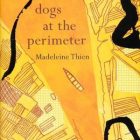Literary Boroughs #32: Madrid, Spain
The Literary Boroughs series will explore little-known and well-known literary communities across the country and world and show that while literary culture can exist online without regard to geographic location, it also continues to thrive locally. Posts are by no means exhaustive and we encourage our readers to contribute in the comment section. The series will run on our blog from May 2012 until AWP13 in Boston. Please enjoy the thirty-second post on Madrid, by Lawrence Schimel. -Andrea Martucci, Ploughshares Managing Editor
Located on the Manzanares River, in the center of the Iberian peninsula, and nestled between the autonomous communities of Castille and León and Castille-La Mancha, Madrid is the capital of Spain—both the seat of its government and the home of its monarch. At over 6 million inhabitants in the metropolitan area, Madrid is the third-largest city in the EU, after London and Berlin, so it is comprised of many smaller neighborhoods and districts, many of which also have their own unique literary flavor and/or form part of and participate in the city’s larger artistic communities. Madrid has both a long literary and artistic tradition (Golden Age writers Lope de Vega, Quevedo, and Tirso de Molina Lorca were all born here, whereas many other writers, from Cervantes to Lorca–not to mention artists such as Velázquez and Goya–lived here) as well as a thriving and active creative community in the present day. While most of the large, commercial publishers are concentrated in Barcelona, Madrid is home to many writers and a plethora of independent publishers.
What the City is known for/what makes it unique:
The Prado Museum, the Reina Sofía Museum, its soccer teams
Resident writers (a very incomplete list):
Elvira Lindo, Francisco Umbral, Almudena Grandes, Alvaro Pombo, Ana Rosetti, Eduardo Mendicutti, Rosa Montero, Antonio Muñoz Molina, Mercedes Cebrián, Fernando Marías, Espido Freire, Óscar Esquivias, Juana Salabert, Rafael Reig, Laura Freixas, Luisgé Martín, Vanesa Pérez-Sauquillo, Lorenzo Silva, Sofía Rhei, Luis Antonio de Villena, Pilar Adón, Jordi Doce, Blanca Riestra, Jorge Semprún, Ángela Vallvey, Domenico Chiappe, Elivra Navarro, Ignacio del Valle, Marian Womack, James Womack, Adriana V. López, Carlo Frabetti, Lucía Etxebarría, Vicente Molina Foix.
Where to learn:
For English-speakers: Many American universities have Madrid campuses, including among others Syracuse, Middlebury, and Washington University-St. Louis. The recently-dismantled MFA program from the University of New Orleans used to have summer sessions in Madrid.
For writers working in Spanish:
Hotel Kafka (@hotelkafka) is a writing program founded in 2006 by writers. It offers many different in-person and online courses, as well as a Master’s degree in creative writing. Faculty includes poet and translator Jordi Doce, critic and novelist Eloy Tizón, and essayist and novelist Rafael Reig.
Fuentetaja has been offering creative writing classes since 1986. They offer perhaps the broadest catalog of courses, both in person and online, running from introductory classes to highly specialized, nuts-and-bolts aspects of a particular genre or form.
Función Lenguaje was born from the ashes of the Escuela de Letras. They also offer a Master’s degree in creative writing, as well as various in-person and online courses on subjects such as visual poetry, constructing characters, travel writing, and hybrid genres.
Where to find reading material:
For new books in English, the best choices are probably multilingual bookstore Paisajes or the newly opened La Central in Plaza Callao (see below). For second hand books in English, there’s J&J Books & Coffee which is also popular with ex-pats, especially for their happy-hour.
At the foot of the Botanical Gardens, near the Atocha train station, is the Cuesta de Moyano, a pedestrian street of second-hand bookstalls, open year round, that feature a vast range of books, from old and rare volumes to inexpensive commercial titles.
Depite the economic crisis, the city has recently seen the opening of a number of superb independent bookshops, such as these three shops in the hip neighborhood of Malasaña: Tipos Infames, whose slogan is “Libros y vinos” (Books and Wine), opened in late 2010 and quickly distinguished itself among the independent & literary crowd. As befitting its bodega, it stays open late, perfect for after-dinner book-browsing. They also have a downstairs space that’s often used as a gallery or for book presentations.
Tres Rosas Amarillas is a bookshop specializing in short stories, both single-author collections and anthologies, as well as magazines and also children’s books. And recently there is also Cervantes & Cia., a new general literary bookshop that have bravely opened their doors in the midst of the austerity measures in Spain.
The newest arrival on the Madrid is La Central‘s opening of a literary superstore in Plaza Callao, in a refurbished 1,200 square meter palazzo, which promises to become an essential visit for lovers of literature. In addition to quality fiction, poetry, and essays in Spanish, they boast a vast collection of quality literature in many languages (English, French, German, Italian).
Note: Spain has a fixed-price law for books, which means that all stores must sell titles at the stated cover price; this is an attempt to protect independent stores from the competitive (and often cut-throat) pricing strategies of larger chains and conglomerates.
Where to get published:
Differently from the U.S., there are not many literary magazines in Spain, and the path to publication is generally not to publish first in magazines and then publish a collection; if anything, the opposite seems to hold true, with writers who are already established being the ones who are asked to contribute to journals.
One path to publication in Spain for poetry is through contests, which are often sponsored by a local governmental agency or entity; some of these prizes can command large prizes (18,000€ for the Lowe, for instance) and competition is fierce (and accusations of cronyism are also quite common–especially the larger the purse).
One good source for information on literary contests (in short stories, novels, poetry, and other modalities) is the Guía de Concursos Literarios blog.
Another possible path to publication is to make a name for oneself through readings. Madrid has a lively poetry recitals scene (with much less of a spoken word scene), and while print publishing is suffering right now, especially with the country’s current economic woes, there are usually multiple literary readings and events every night of the week–which are often a good way for writers to become to establish a name for themselves.
One independent publisher, Amargord Ediciones, is best known for their poetry, although they also publish fiction and children’s books. They even have an imprint, Hecho en Lavapiés, featuring writers who have established a name for themselves by giving poetry recitals at this bohemian neighborhood’s many bars and cafés.
Some other venues with regular reading series (for all genres, not just poetry) include Café Libertad which is especially known for its storytelling, and Los Diablos Azules and the Bukowski Club, both in Malasaña.
Where to write:
Madrid has a vibrant café culture, so places abound for a writer with a laptop (or pen and pad) to settle in and look for the muse with the help of caffeine or alcohol (or both). Various plazas across the city also have free municipal wifi–although that might not be conducive to getting writing done!
Those writers who need peace and quiet around them can apply for accreditation to allow them admittance to the Spanish National Library or the Reina Sofía Museum’s library, where they can work in a hushed environment among similarly-studious colleagues.
For those looking for an English-language writing community, various writers groups regularly advertise for new members in IN-MADRID Magazine. Another place to look are on the bulletin boards at J&J Books & Coffee or at Paisajes Libros–and if you don’t find what you’re looking for, put up your own sign and advertise for like-minded souls.
Events/Festivals:
As Spain’s largest city, Madrid has so much on offer, all the time, that one can overlook the fact that we lack a significant, international literary festival like the ones that other cities in the country enjoy, such as Cosmopoetica (@cosmopoetica) in Cordoba (international poetry festival) or the Semana Negra (@snegra) in Gijón (an international festival devoted to mysteries and other genre work).
Madrid is an obligatory stop for foreign authors to present their latest translated work or give a reading, even when they’re on their way to some international festival in other part of the country. Thus, when George R. R. Martin appeared at the Semana Negra this summer, he also did an event in Madrid after the festival.
Perhaps the biggest book event in Madrid is FLM: Feria de Libros de Madrid. This annual three week bookfair takes up residence in Madrid’s Retiro Park at the end of May/beginning of June. Bookstores offer a 10% discount, and many writers come to the fair to sign copies of their latest titles.
One annual festival is Poetas por km2 a celebration of Spanish-language spoken word poetry and alternative presses, which has had a growing participation of international Spanish-language poets in recent years with the addition of Casa de América as a co-sponsor.
Any writer’s favorite holiday in Spain is Sant Jordi, April 23rd, celebrated in Catalunya by giving a book and a rose to loved ones. It’s an important day for the Spanish publishing industry (10% of all books sold in Catalan per year are sold on that one day), although in recent years it has suffered from a homogeneity of bestsellers appearing at all the stands.
Madrid has responded with an initiative called La Noche de Los Libros (“The Night of the Books”) during which all bookstores in the city stay open until midnight, with a series of readings and concerts at bookshops, libraries, and other civic institutions.
In response to the very staid and mainstream list of authors invited to take part in this initiative, La Noche de Los Libros Mutantes (“The Night of the Mutant Books”) was born, focusing on alternative publishers and authors. This has evolved into a week-long international celebration of fanzines, artist books and other creative forms of self-publishing, with a parallel series of workshops and lectures, held at La Casa Encendida each April.
Lawrence Schimel writes in both Spanish and English and has published over 100 books as author and anthologist. He’s won a Lambda Literary Award twice, for First Person Queer (Arsenal Pulp) and for PoMoSexuals: Challenging Assumptions About Gender and Sexuality (Cleis), and has also won the Spectrum Award, the Independent Publisher Book Award, and the Rhysling Award. His picture book No hay nada como el original (Destino) was chosen for the White Ravens 2005 and his picture book ¿Lees un libro conmigo? (Panamericana) was chosen by IBBY for Outstanding Books for Youth with Disabilities 2007. His most recent Spanish-language picture book, ¡Vamos a ver a Papá! (Ekaré), was translated into English by Elisa Amado and published by Groundwood as Let’s Go See Papá! As a Spanish-English translator, he has translated fiction, poetry, and essays by writers such as Juan Goytisolo, Jordi Doce, Care Santos, Joan Fontcuberta, Vicente Molina Foix, Sofía Rhei, and many others, for magazines, anthologies, festivals, and publishers. He is also the publisher of the English-language poetry press A Midsummer Night’s Press (www.amidsummernightspress.com & twitter: @AMidsummerNight).



![Gatekeepers Part Four-point-One: on why the [red] pen is mightier than the sword (and other politically useful clichés) cartoon illustration of a "pen knife"](https://blog.pshares.org/wp-content/uploads/sites/10/2012/05/pen-knife-140x140.gif)